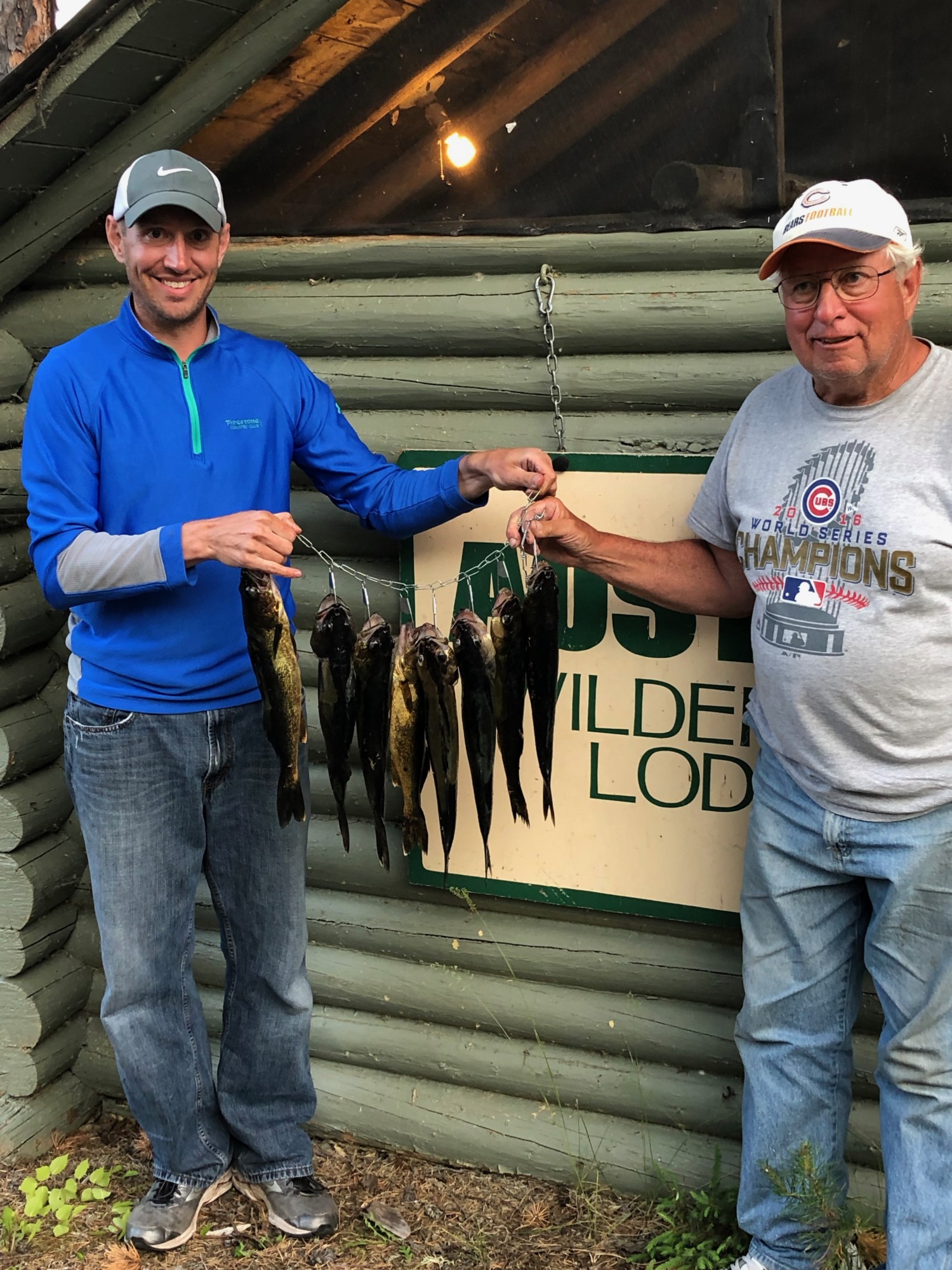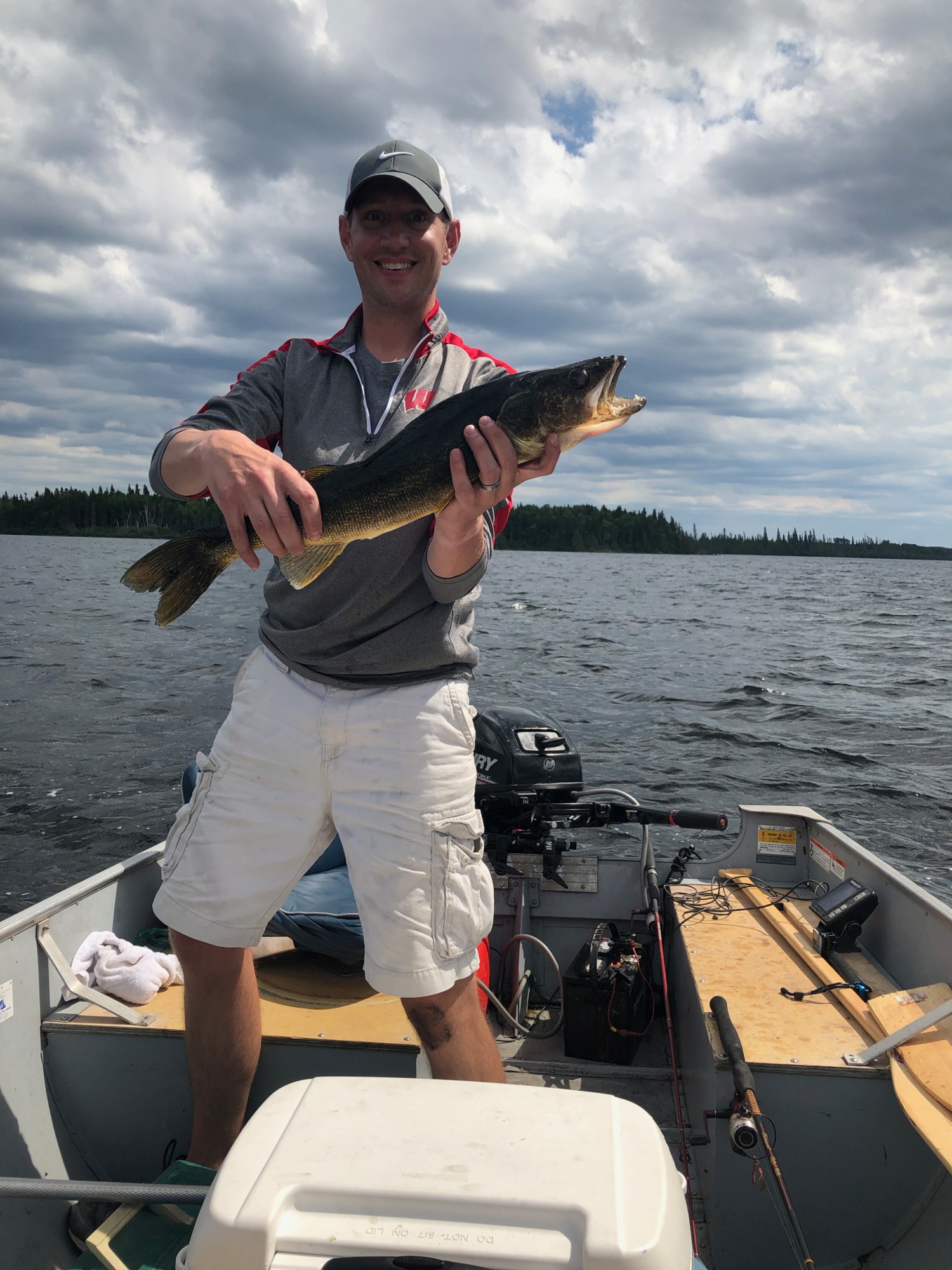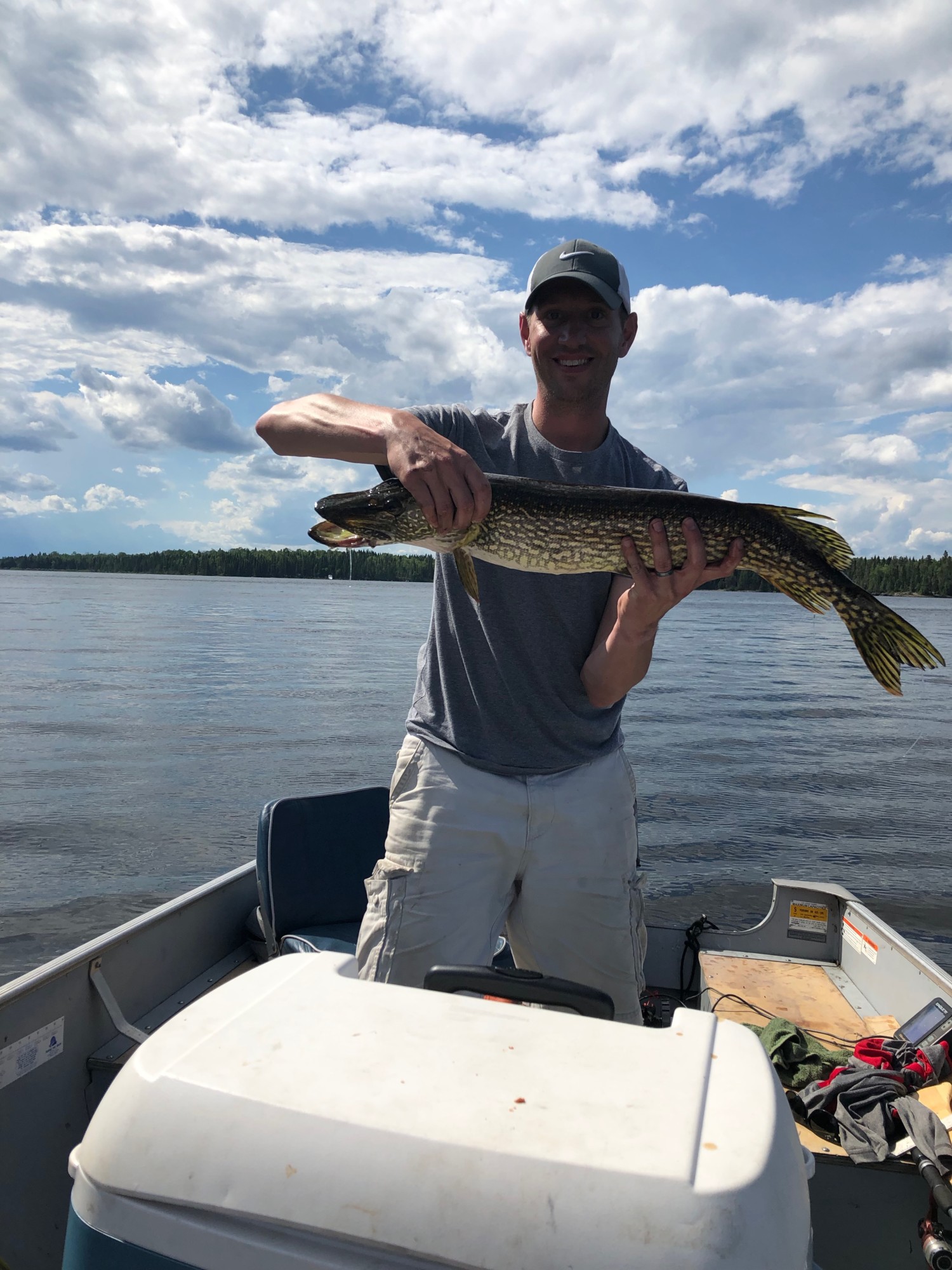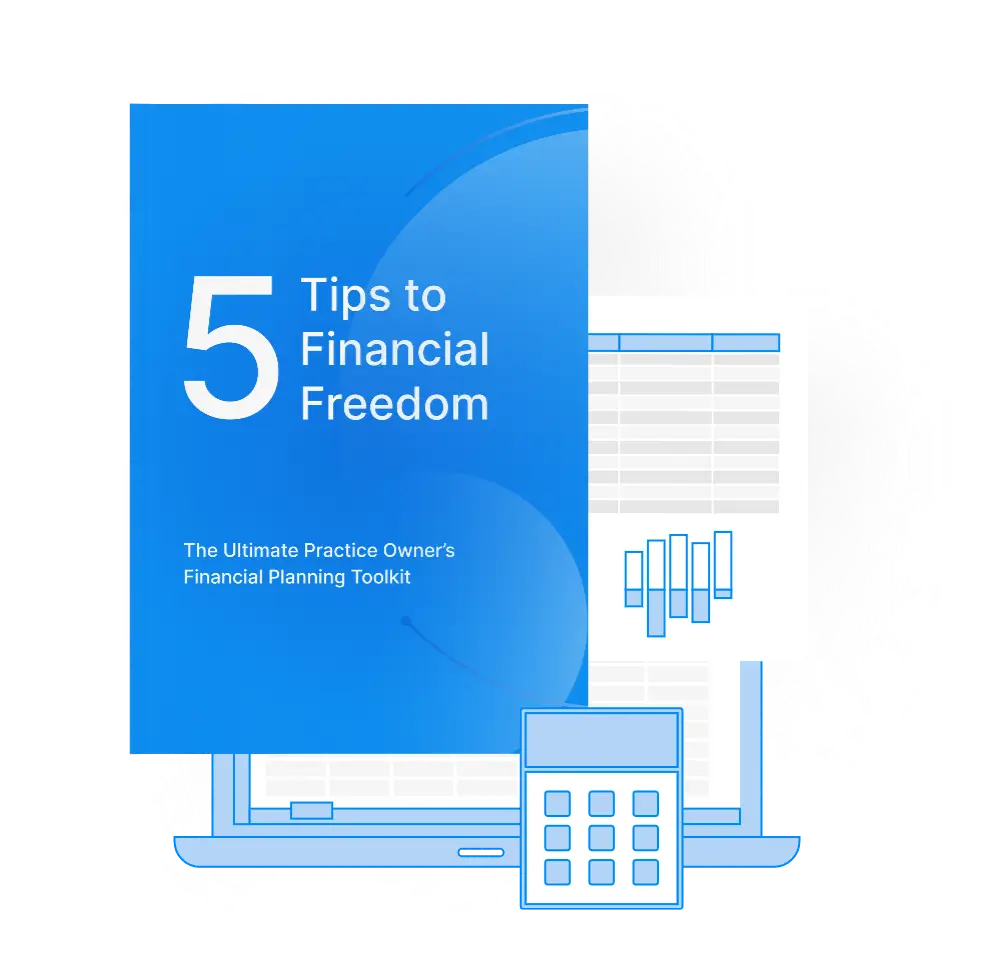“What if?” – A few thoughts after my trip to Canada
August 12, 2019
At the end of June, my dad and I (along with my brother-in-law and his cousin) set out on a fishing trip up to Canada. There’s some history and nostalgia behind this trip: my dad and I had taken many of these trips when I was a kid and this was our first time back in 18 years. We had always talked about going back, but we both always had something else going on or some other reason that precluded us from making the trip back. What made this trip a bit more special, though, is that we were going back to the same lodge and lake that we visited on our last 5 trips when I was a kid.
The genesis of this trip actually started out in a meeting with one of my clients. He also enjoyed fishing and we had talked about how much fun each of us had had on our fishing trips from each of our perspectives: him with his sons, and me with my dad. It was shortly after that client meeting towards the end of the summer in 2018 that I realized that while I could have come up with reasons not to go, none of them were really good reasons or ones that couldn’t otherwise be planned for in advance. So at the end of June we found ourselves in the same camp, on the same lake, fishing the same spots, and having shore lunches at the same location we did 18 years ago. To sum it up: it was awesome! Great weather, amazing scenery, great food, and just an all-around great trip.
The “executive summary” of the fishing was that it was subpar fishing with the biggest reason being that we were at the tail end of the annual Mayfly hatch that typically happens at the end of May or the beginning of June. For some reason, though, this year the spawn and hatch ended up being about two and a half weeks later than normal, which meant the fish were still feeding (and full) of mayflies by the time we arrived in camp. The mayflies were so prevalent that we encountered “slicks” of dead mayflies on the top of the lake as we were riding through the open water. Seeing this on our first day out fishing, we weren’t sure what to expect and were a bit nervous about how well the fish would be feeding. Turns out, we were correct in our nervousness—the quantity of fish caught over the week was definitely on the lower end compared to past trips.
Start Planning Today
Don’t miss out on exclusive access to financial tips, strategies, and expert-led webinars. Subscribe to the “Planning Life, On Purpose” newsletter today and stay ahead of the planning curve!
While we certainly didn’t catch the quantity of fish that we’re used to catching, we still did catch fish. Each day the fishing got better and better, and by Thursday we had our best day. We estimate that we caught around 50 Walleye in total (all catch and release sans 3 for shore lunch). We were also lucky enough to come across a great fishing spot that was in very close proximity to a bald eagle nest, where we observed “Mom and Dad” caring for three eaglets that were still in the nest. The tree was right on the shoreline and we were fishing only about 20 yards from shore. We estimated the tree to be about 30 feet high. If you want to bust out Pythagorean’s Theorem to find how far away we were line-of-sight, have at at. Here’s your reminder on the formula from 6th grade math class: a(2) + b(2) = c(2).
Yours truly took home the “biggest fish of the week” prize in both categories (Northern and Walleye). My Northern was 35″ long and my Walleye was 25″; both of them released.
It was a great opportunity to spend some time with Dad and go back to visit a place that brought us so much joy and made so many memories almost two decades ago. There were new memories made (I don’t think either of us will ever be able to hear a moose call again without laughing…inside joke) and past memories recalled. Our perspective on life is the sum of and the interpretation of our experiences and this trip caused me to to reflect on a number of observations. While there were many of them, I wanted to share a few with you below.
Don’t underestimate how much your physical environment can change your mental state. Leaving on this trip was going to be as much of a mental change of scenery as it was a physical change of scenery. As much as I was looking forward to the physical change of scenery, I discounted how impactful that physical change was on my mental state. Suffice it to say that being completely “out of my element” and in a new environment significantly helped me refresh and re-engage my mindset when I got back. I think this is what really helped me with the next point.
How easy it was to disconnect. Before going on the trip, I was actually quite curious (and borderline nervous) to see how difficult it was going to be to disconnect from everything in life and truly “just be” without the constant stimulation from the outside world. As it turns out, it wasn’t as difficult as I thought it would be and I was quite surprised at how little “FOMO” (fear of missing out) I had as it relates to keeping up with what has become my normal routine. I came across this interesting article that talks about how most great ideas that we have don’t occur when we’re actually trying to come up with good ideas but rather when we’re being present in the moment and ideating or thinking about something else. I know most of my really good ideas (which then turned into a plan and executing that plan) have occurred when I’ve been on a run listening to a podcast, while reading a book, or in good conversation with a friend or colleague. Our phones have become a quick escape from reality and if our minds are always being stimulated, it can inhibit the critical thinking that’s required to come up with new plans or ideas or, worst case, slowly but surely making us addicted to the apps and platforms we’ve grown to consume. All this has gotten me thinking about ways in which I can “detox” my life so that the daily stimulations become less and less, allowing me to “just be” and not always have something going on.
Start thinking about life not in years but number of experiences. The last year or so I have become fascinated and curious about time and how we spend it. Time is like money: it’s a currency. We only have a finite amount of it available and how you spend/invest it will dictate the return you get on it. Where time is different than money, though, is that we don’t know how much currency we have left in the bank. You may have heard the (cliche) phrase of “the past has already occurred, tomorrow may never come…that’s why we call today a present.” It can become very easy for us to take the present for granted and just assume that we’ll get another today tomorrow, but that’s not always the case.
What has been amplified on this mindset has been in the way that I think about the construct of time. Most of us are probably used to thinking about time in days, weeks, months, or even years. However, once you start thinking about it not in the arbitrary unit of measure that we have created as mentioned but in the number of experiences you have left, I felt a shift in the motivation and intentionality of how I spend my days.
My dad and mom are 68 and 60, respectively, and live in WI. I get to see them (and the rest of my family) only a handful of times per year. If I had to pick an arbitrary number to illustrate this example, let’s say that my family (my wife and two young daughters) get to see my parents 4x per year and my dad lives another 15 years. That means that I don’t have 15 years left with my dad…I have 60 visits.
I know what you’re thinking. “How can you put a number on your dad’s mortality? That’s such a morbid way of thinking?” I can’t, and my intention isn’t to think about death but rather put my focus on maximizing life. I’m doing it to illustrate a point. I may not have 15…it might be 3. It might be 25. Think about yourself and the relationship you have with someone very important in your life and put it through the filter of the number of experiences you might have left, not the number of years.
We. Just. Don’t. Know.
Through this filter, it made sharing the experience of being back in Canada with my dad at the same spot that much more enjoyable and with a heightened sense of gratitude.
Understand the three types of regrets. I could have come up with so many reasons (excuses) to NOT go on this trip. It would have been very easy to create that list and justify how “it just wasn’t a good time” or any other set of reasons. It’s easy for us to do this in many areas of our lives. We can always find a reason to not do something that’s outside our normal routine. It’s quite biological. We know what we like and like what we know. It’s safe and predictable, which is what our brains crave.
If we’re not cognizant of this force at work, it’s quite possible to go through life always living in our safe bubble and just “keep on keeping on.” We eat the same food. We visit the same restaurants. We have the same friends. We keep the same job. We watch the same shows. We do the same activities. Absent of moving outside of our comfort zone, though, I wonder how many different opportunities and experiences we might miss if we didn’t proactively ask “What if?” What if I took this job? What if I quit my job to find a better one? What if we planned for and took that trip? What if we tried that new restaurant? What if we pursued that hobby? What if we tried a new sport? What if we read a book whose viewpoint challenged our current belief structure and bias? What if engaged in a random conversation with a stranger. What new and awesome experiences and memories could we create for ourselves and our families if we colored outside the lines a bit more than we do right now?
I’ve come to learn that there are three types of regrets in life. The first are regrets that we cannot change. You wish you would have taken that new job, distanced yourself from people that had a negative influence on you, started that business. Unfortunately, though, the past is the past and you can’t change it (but I hope you learned from it). The second type of regrets are the ones you can fix. Estranged relationships, sub-par performing business, unhealthy diet and lifestyle—all of these non-ideal circumstances are ones that you can control and rectify RIGHT NOW. The third type of regrets are the ones that we can prevent. Had we not taken the trip and something happened to my dad that would have prevented us from taking the trip, I would have been very frustrated (mad) with/at myself for not making it happen. However, I was able to prevent that from happening by taking action, which was the last big takeaway that I realized while in Canada.
Take action. It dawned on me during one of my early-morning runs (which, by the way, when you’re running in Canada as far north and as close to the summer solstice as we were, it was pretty weird to be running at 6 am in as much daylight as we’re used to having at 10 am here in Indiana) that being on this trip with Dad actually didn’t take that much work. All it took was a commitment. It took me having the idea, discussing it with my wife, telling my dad about it, and then taking the necessary steps to make it happen. I also found it interesting how imbalanced the input and output were. It didn’t take an incredible amount of effort (input) to make the trip happen, but the output and results will last a lifetime.
So my question to you is this: What are you waiting for? Where can you take action in your life whereby a series of small inputs outside your normal routine can have a massive impact? Is it in your finances? Your relationships? Your business? Your spiritual journey? A hobby? Whatever it is in your life that you know could be better, it doesn’t have to stay that way. Plan accordingly and responsibly (financially and otherwise). It all starts with asking this one question: “What if?” From there, the journey is up to you.





Share